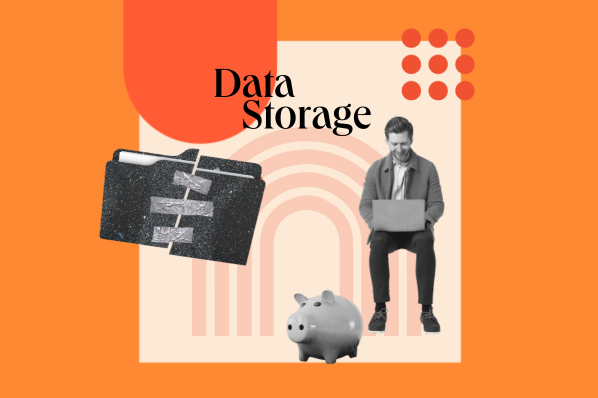Data storage is an essential component of any business in the modern age. Not only do businesses need data storage to keep important customer information organized and secure, but they must also choose a reliable data storage solution that fits their budget and meets the specific needs of their organization.
In this blog, we’ll cover what data storage is, how important it is for businesses today, and provide tips for choosing your company's best solution. From cloud technology to virtual machines and beyond, consider this article as your resource for understanding different types of data storage options so you can make an informed decision about what works best for your business.
Data storage options are essential for keeping your business records safe from unauthorized access and cyberattacks. With so much dependent on digital files, the right data storage system is critical for any business.
Data storage can also be used to store and back up large files, like videos or images, that take up a lot of space on your computer’s hard drive. This will help you free up space on your machine while keeping the important data stored away safely.
Types of Data Storage
Many data storage solutions are available today, from traditional hard drives to cloud-based systems. Depending on your business’s specific needs, you can choose the right type of data storage for your company.
- Local Hard Drive: A local hard drive is installed onto the computer and will store your data in a single location. This is the most common type of storage, and it’s great for storing documents, pictures, and audio files.
- Cloud-Based Storage: Cloud-based storage systems are becoming increasingly popular among businesses today. These systems provide users convenient access to their data from any device connected to the internet. Popular cloud-based storage systems include Google Drive, Dropbox, and Apple’s iCloud.
- Network Attached Storage (NAS): NAS is a type of external hard drive that connects to the internet via your router. This data storage system is ideal for businesses with multiple users who need access to files in one central location.
- Virtual Machines: A virtual machine allows you to store data on a remote server, giving users access to their files from anywhere with an internet connection. This is great for businesses that need to collaborate and share large files quickly and securely.
Choosing the Right Data Storage Solution for Your Business
Now that you know what data storage options are out there, it’s time to decide which type of storage is right for your business.
When choosing a data storage solution, make sure to consider the size and security of the system. How much space do you need? Does the system come with built-in security features? These are just a few important questions to ask before selecting.
You should also think about the cost of the system and if it’s within your budget. Many cloud-based solutions and virtual machines offer more affordable rates compared to traditional hard drive systems, so be sure to do your research before making a decision.
Finally, consider how convenient it will be to use the data storage system. Does it provide users with a secure and easy-to-use platform? Can everyone access their files quickly, regardless of their location? It’s important to choose a solution that makes accessing documents simple and straightforward.
The Best Way to Back Up Your Data
When you choose a data storage solution, it's important to think about how it will fit with the other stages of your data lifecycle.
For example, how will you transfer data from the apps you collect it in, such as your CRM, and your storage app? And if you need to restore your data, how will you ensure a robust recovery process?
Some organizations choose to back up all data, while others archive inactive data. You might choose to back up that data once an hour, day, or week. Your storage strategy will be unique to your company.
Considerations for backing up your data include:
- Budget for storage space required
- Frequency of backups
- Integrations with your business
- Security such as two-factor authentication
- Additional offline backups
- Dedicated archives for inactive data
- Individual user access and accounts
- Ease of recovery
Cloud data storage depends on certain factors – including company size, the security risk of the type of work and client base, and budget. The main difference between cloud data storage for small businesses and enterprises is the volume of data stored.
How Enterprises Can Back up Their Data
Enterprises usually hold data on a much wider customer base, and they often have the time and budget to develop a more comprehensive view of each contact. A bigger database requires much more space, complexity, and security when backing up or archiving that data.
One important concern for enterprises when choosing a data storage system is avoiding overexposed data. This starts with user access. The 2019 Varonis Global Data Risk Report found that in 53% of companies studied, over 1,000 sensitive files were open to every employee.
The best way for enterprises to back up their data is to find a scalable and secure solution that will support their database size and complexity now and further down the line.
Some of the best cloud data storage companies based on user reviews on G2 Crowd for enterprises are:
How Small Businesses Can use Cloud Data Storage
As a small business, you are most likely to want a straightforward data storage solution that fits your budget and enables you to easily back up data from your other cloud apps.
However, being a small business doesn't necessarily mean you have a small amount of data. Small businesses can fall into the trap of accumulating enormous databases and can even have more disarray than more organized enterprises. Before backing up your data, clean up your database to keep things organized from the start, and even lower your storage costs.
The most popular cloud data storage vendors for small businesses are:
Both small businesses and enterprises need to consider data recovery as part of their backup process. If your database is corrupted or needs to be restored to a previous version for other reasons, there must be a readily available backup that can be implemented.
Remember The Key Components of Effective Data Storage
To store your data effectively, remember to back up clean data in a timely way that fits your overall data lifecycle. This means looking at the data you're collecting, identifying what needs to be backed up, and understanding how you might need to recover or remove it in the future.
By storing your data in a way that reinforces your organization's wider data strategy, you can avoid common data challenges and stay efficient as you look after your data.












